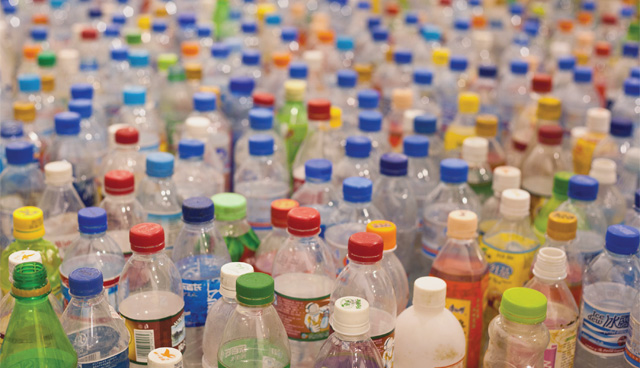Ending the use of single-use plastics in government offices

New Decade, New Approach pledged the ending of plastic pollution in Northern Ireland. In response, an action plan published in 2020 also committed to ending the use of single-use plastics in Civil Service procurement by October 2021.
Progress towards the ending of plastic pollution in Northern Ireland since the pledge made in the New Decade, New Approach agreement has not been particularly quick; while Northern Ireland’s recycling has enhanced significantly in recent years, the practice of landfilling remains too common. In efforts to reduce Northern Ireland’s levels of landfill to a targeted 10 per cent by 2030, treatment and reduction of plastic waste will be essential. The publication of the Single-Use Plastic Reduction Action Plan for the NICS Government Estate by the Department of Agriculture, Environment and Rural Affairs (DAERA) and the Department of Finance (DoF) has signalled the public sector’s intent to move away from the use of single-use plastics.
The Plan notes that “plastic can literally contribute to saving lives in our health service. Plastic has many beneficial properties, such as prolonging the life of food thus reducing harmful carbon emissions from food waste” and states that “we must be careful not to demonise all plastic”. Instead, the plan focuses on single-use plastic items such as bottles, cups, straws, stirrers, containers, cotton buds, disposable cutlery and plastic bags.
The plan provides guidance and instruction on the removal of single-use plastics from the central government estate offices. These instructions will be carried out by all core government departments and Executive agencies and non-departmental public bodies are also invited to establish similar initiatives.
The action plan was introduced from October 2020 as an attempt on the Executive’s behalf to “lead the way and set a positive example to others by getting its own house in order”, with the aim of allowing departments and supply chains to phase in alternatives to single-use plastics in time for a blanket ban on them coming into effect on 1 October 2021.
A complete list of the items to be removed from government offices under the plan is provided within the document, such as single-use sachets for sauce, coffee, etc, takeaway cutlery; and single-use containers for hand soap or cleaning products. Operational single-use plastics, such as clothing or equipment used for medical or health and safety reasons and toner cartridges, are not included within the scope of the plan.
“DAERA, in partnership with Department of Finance, has removed all unnecessary single-use plastic from the Government estate within the target date of October 2021. A voluntary ban on the use of single-use plastics was introduced across the Northern Ireland Civil Service estate is now in place from 1 October 2021.”
The actions under the action plan are grouped into two areas: raising awareness and changing behaviour across the Northern Ireland Civil Service, with an objective of changing internal practices in order to eliminate single-use plastics and increase recycling rates across the government estate; and working with government suppliers and contractors to bring forward proposals on the implementation of green public procurement to eliminate single-use plastic in government supplies, services and works and to find sustainable replacements where appropriate.
Despite stating that “a number of departments are looking to move faster”, DAERA and the DoF recommended a target date of October 2021 for the removal of all single-use plastics from central government offices, “to give all departments adequate time to adjust relevant contracts”. The implementation of the plan was split into two distinct phases: phase one, the voluntary phase out scheme from October 2020 to September 2021; and the outright ban from October 2021 onwards.
The plan instructed departments to work with their suppliers in order to replace existing single-use plastics and to replace their single-use plastic items with sustainable alternatives, with measures to be “cost-neutral, either directly, or as a result of saving elsewhere in the supply chain or in the waste management process”.
DAERA and the DoF also advised the departments: “In some circumstances, if unavoidable, it may be necessary to run down existing stock of single-use plastic products held by a department or a supplier on their behalf, before replacement non-single-use plastic items are introduced. Such situations must be agreed in advance between suppliers and departmental customers, and the practice should not continue beyond Phase 1.”
A network of ‘environment champions’ will be appointed to lead within their own departments. DAERA will also “share information gathered from supplier progress statements and enable further progress and collaboration through cross-departmental forums, such as the NICS Environmental Working Group”.
In a statement to agendaNi, DAERA said: “DAERA, in partnership with Department of Finance, has removed all unnecessary single-use plastic from the Government estate within the target date of October 2021. A voluntary ban on the use of single-use plastics was introduced across the Northern Ireland Civil Service estate is now in place from 1 October 2021… Arm’s Length Bodies were invited to set up a similar scheme in June 2021 and we are currently working with them to establish work achieved or planned, offering support and guidance if required. Data is being collated from all Departments to help inform an annual report on the implementation of the plan. This report will be published in due course.” The Department also noted that it is currently consulting on the reduction of single-use plastic beverage cups and food containers and is seeking public responses, and that it has provided over £600,000 in funding for the Tackling Plastic project led by Keep Northern Ireland Beautiful.
Construction and Procurement Delivery carried out a six-monthly review session with the relevant suppliers in order to determine the progress achieved and to agree next steps. Government departments and participating public bodies were also required to provide reports to their respective ministers on the actions being taken to enable DAERA to assess progress. Lastly, DAERA will carry out an annual review of the action plan in order to update the actions within accordingly.





